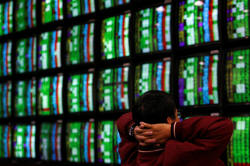World stocks perk up as volatile week ends on high note
 Send a link to a friend
Send a link to a friend
 [July 23, 2021] By
Dhara Ranasinghe [July 23, 2021] By
Dhara Ranasinghe
LONDON (Reuters) - World stock markets
perked up on Friday after a volatile week in which sentiment over the
global economic outlook waxed and waned with each new headline on the
Delta variant of the coronavirus.
Upbeat earnings helped lift European equities, while U.S. stock futures
rallied in a positive sign for the Wall Street open. But Asian shares
outside Japan were lower as COVID anxiety continued to take a toll.
Financial markets have swung from one direction to another this week as
investors try to assess what the surging Delta variant means for the
world economy.
After recording its steepest one-day drop since May on Monday, the S&P
500 stock index went on to post the biggest one-day jump since March a
day later. It was set to end the week higher. Currency, bond and
commodities markets have seen similar gyrations.

"Equity markets are signaling some symptoms of being tired after a long
rally and recognise the peak growth environment," said Antonio Cavarero,
head of investments at Generali Insurance Asset Management.
"But in the short-term, real yields are still too low to provide an
alternative, so the evolution of what happens next depends on COVID and
the macro data."
The pan-European STOXX 600 index rose 0.9% and was set for a 1.2% weekly
rise, its best in a month, supported by upbeat earnings. French car
parts maker Valeo jumped 8% after it posted higher first-half sales and
profit.
MSCI's broadest index of Asia-Pacific shares outside Japan slipped 0.7%,
leaving it down 1.4% on the week.
Japan's Nikkei was closed for a holiday, but off 1.7% for the week and a
whisker away from a seven-month trough.
Graphic: S&P 500 stock index vs absolute change, daily -
https://fingfx.thomsonreuters.com/
gfx/mkt/klpykegajpg/stx2307.png
Financial market volatility was expected to continue, given the
resurgent Delta variant and economic uncertainty.
There were mixed signals from business activity surveys tracked closely
by investors. In Britain, the IHS Markit/CIPS flash composite purchasing
managers index (PMI) dropped to 57.7 in July from 62.2 in June, its
lowest since March.

[to top of second column] |

A man looks at stock market monitors in Taipei January 22, 2008.
REUTERS/Nicky Loh

But the composite euro zone PMI climbed to 60.6 in July from 59.5, its highest
reading since July 2000. It was ahead of the 50-mark separating growth from
contraction.
"Uncertainty has increased again with the pandemic," said Pascal Peronne, a
fixed income portfolio manager at Eric Sturdza Investments in Geneva. "I don't
think there will be a closing of economies to the extent we saw last year, but
we don't know."
Russia's central bank meanwhile increased its key rate to 6.5%, delivering its
sharpest rate hike since late 2014 amid stubbornly high inflation.
The rouble was largely unchanged after the move, hovering at 73.65 against the
dollar.
RISK ON
Risk-on sentiment in equities eased demand for safe-haven debt.
U.S. 10-year Treasury yields rose 2.5 basis points to 1.29%, above five-month
lows of 1.128% hit early in the week. [US/]
German 10-year bond yields rose too, meaning prices fell. At -0.40%, yields held
above recent five-month lows.
But sentiment towards European bonds was supported by a dovish European Central
Bank, which pledged on Thursday not to raise rates until inflation was
sustainably at its new 2% target.

"If we see substantive policy action in the months ahead to back up the new
inflation goal, I would not be surprised to see bond yields push lower and
market-based inflation expectations rise," said Katharine Neiss, chief European
economist for PGIM Fixed Income.
The dollar was set to end the week with small gains after a turbulent few days,
with the dollar index up 0.2% for the week, rising on Friday to stand at 92.917.
The euro was a touch weaker at $1.1766, while sterling shed around a quarter of
a percent to $1.37.
Elsewhere, Brent crude oil was down 0.3% at $73.56 a barrel, after jumping 2.2%
on Thursday, while U.S. crude fell 0.25% to $71.73 per barrel.
(Reporting by Dhara Ranasinghe; Additional reporting by Wayne Cole in SYDNEY;
Editing by Ana Nicolaci da Costa and Pravin Char)
[© 2021 Thomson Reuters. All rights
reserved.] Copyright 2021 Reuters. All rights reserved. This material may not be published,
broadcast, rewritten or redistributed.
Thompson Reuters is solely responsible for this content. |